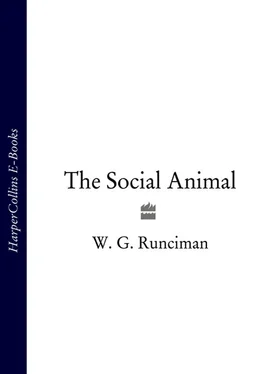With hindsight, it’s unsurprising that the nineteenth-century conception of social evolution survived into the twentieth century in its Marxian rather than its Spencerian form. It did so not only because of the increasing attraction of Marxism as a reasoned prophecy of the overthrow of capitalism, but also because of the steadily diminishing attraction of Spencer’s refusal to countenance the involvement of the state in matters of social welfare. Not that Spencer fell out of favour entirely. He even enjoyed something of a revival in the 1960s, and the American sociologist Talcott Parsons, who in 1937 had opened his first book, The Structure of Social Action, by quoting from the historian Crane Brinton the rhetorical question ‘Who now reads Spencer?’, can be found in 1966 publishing a little book called Societies in which he explicitly readmits into sociology the notion of evolution in terms which could have been written by Spencer himself (complete with the mistake of equating evolution with progress). 6 But Marxism aside, the dominant ideas in twentieth-century sociology have been explicitly anti-evolutionary. There are three of them: Functionalism, Structuralism and Behaviorism (deliberately spelled without the ‘u’ – it’s very much an American doctrine).
Functionalism was most influentially expounded in the 1920s by the anthropologists Bronislaw Malinowksi and A. R. Radcliffe-Brown – the latter explicitly influenced by Durkheim. Its basic tenet was that the distinctive patterns of behaviour observable in different human societies are to be explained not in terms of their history but in terms of the contribution which the behaviour makes to the workings of the society as a whole. As a reaction against the purely conjectural histories to which many nineteenth-century evolutionists had committed themselves, this was salutary. But it invited the obvious rejoinder that change has still to be explained. After all, even the stablest-looking societies were different at some time in the past and will be different again at some time in the future. To this, the functionalist reply is that when a society does change, the explanation of what it changes into will still depend on an analysis of the function of the new institutions which have emerged in place of the old. But the flaw which remains is the implicit presupposition that the normal state of human societies is an equilibrium between their component parts. No theory which purports to be able to explain why human societies are as we find them can possibly dispense with the notion of function. But nor can it achieve its intended purpose if it fails to acknowledge that conflict and change are as ‘normal’ a feature of human societies as cohesion and stability. It’s not just that the explanation of change requires an analysis of the functions of the practices by which the society’s roles are defined rather than of the connections between the institutions constituted by them. It’s also that those mutant practices which turn out to be the critical ones may do so precisely because the advantage which they confer on the roles that carry them is mal adaptive for the society’s institutions and thereby for the society itself in its relations with other societies.
Конец ознакомительного фрагмента.
Текст предоставлен ООО «ЛитРес».
Прочитайте эту книгу целиком, купив полную легальную версию на ЛитРес.
Безопасно оплатить книгу можно банковской картой Visa, MasterCard, Maestro, со счета мобильного телефона, с платежного терминала, в салоне МТС или Связной, через PayPal, WebMoney, Яндекс.Деньги, QIWI Кошелек, бонусными картами или другим удобным Вам способом.




![О Генри - Социальный треугольник [The Social Triangle]](/books/405340/o-genri-socialnyj-treugolnik-the-social-triangl-thumb.webp)







